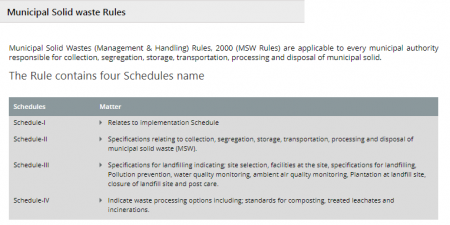Waste segregation systems in India – Waste treatment 27/06/2019 – Posted in: Blog – Tags: Plastic Waste Management (Amendment) Rules 2018, solid waste management rule
WASTE SEGREGATION SYSTEMS IN INDIA- WASTE TREATMENT
For: Preliminary & Mains
Topics covered: Segregation System, Types, Process, Solid Waste Management Rules
Introduction
Isolation of our waste is essential as the amount of waste being produced today caused tremendous issue and immense problems.
There are certain items are not Bio-Degradable but can be reused or recycled in fact it is believed that a larger portion of the waste can be recycled, a part of can be converted to compost, and only a smaller portion of it is real waste that has no use and has to be discarded.
Waste segregation systems in India
Waste can be segregated as Bio-degradable waste and Non-bio degradable waste.
Biodegradable waste is a type of waste that may be degraded by other living organisms. such as vegetables/ fruits waste, paper waste, etc.
Non-Biodegradable wastes are those that cannot break down or degrade for many years.
Solid Waste Management Rules, 2016
Earlier, the Union Ministry of Environment, Forests and Climate Change (MoEF&CC) notified the new Solid Waste Management Rules (SWM), 2016. These will replace the existing Municipal Solid Wastes (Management and Handling) Rules, 2000.
Major highlights:
- Segregation at source
The new rules have mandated the source segregation of waste in order to channelise the waste to wealth by recovery, reuse and recycle.
Waste generators would now have to now segregate waste into three streams- Biodegradables, Dry (Plastic, Paper, metal, Wood, etc.) and Domestic Hazardous waste (diapers, napkins, mosquito repellants, cleaning agents etc.) before handing it over to the collector.
- Sanitary waste: Disposal and collection
The manufacturers of sanitary napkins are responsible for awareness for proper disposal of such waste.
The manufacturers have to provide a pouch or wrapper for disposal of each napkin or diapers along with the packet of their sanitary products.
- Collect Back scheme
The producers or manufacturers of the products in packaging material which are non-biodegradable, should put in place a system to collect back the packaging waste generated due to their production.
- Waste treatment
It has been advised that the bio-degradable waste should be processed, treated and disposed.
It can be done through composting or bio-methanation within the premises as far as possible.
It is advisable that the residual waste shall be given to the waste collectors.
The developers of Special Economic Zone, industrial estate, industrial park to earmark at least 5 per cent of the total area of the plot sheds for recovery and recycling facility.
- Promoting the use of compost
The Department of Fertilisers, Ministry of Chemicals and Fertilizers should provide market development assistance on city compost and ensure the promotion of co‐marketing of compost with chemical fertilizers.
- Waste to Energy
Non-recyclable waste having a calorific value of 1500 K/cal/kg or more shall be utilized for generating energy.
- Waste Management in Hilly areas
The construction of landfills on hills shall be avoided.
Plastic Waste Management (Amendment) Rules 2018
The amended Rules lay down that the phasing out of Multilayered Plastic (MLP) is now applicable to MLP, which are “non-recyclable, or non-energy recoverable, or with no alternative use.”
The amended Rules also prescribe a central registration system for the registration of the producer/importer/brand owner.
Source: Down to Earth
You can follow us on LinkedIn and for more updates related to UPSC IAS Preparation, Like our Facebook Page and subscribe our Diligent IAS Youtube Channel
Also, Read Related other Blogs

